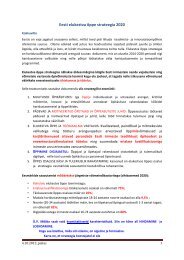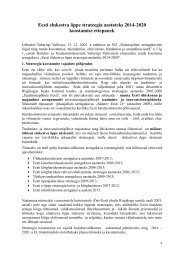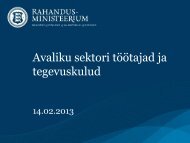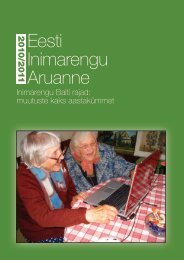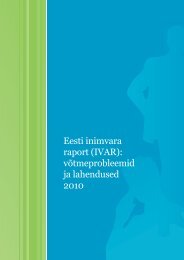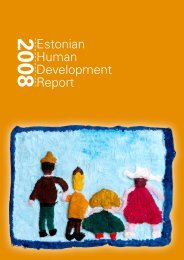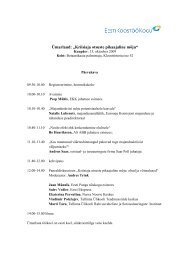DEVELOPMENT
The pdf-version - Eesti Koostöö Kogu
The pdf-version - Eesti Koostöö Kogu
You also want an ePaper? Increase the reach of your titles
YUMPU automatically turns print PDFs into web optimized ePapers that Google loves.
If the respondents’ understanding of the need for greater<br />
focus in state policies was almost unanimous, a clearly<br />
prevailing support for the strengthening of the state’s role<br />
was achieved only in regard to regional policies, social<br />
insurance and the organisation of education. Much-discussed<br />
areas, like the promotion of healthcare, or innovation<br />
policy, were clearly “under the radar”. Increasing the<br />
role of the state in structural policy also did not receive<br />
great support, although, as we see from sub-chapter 5.2,<br />
industrial and technological policies were considered to<br />
be one of the most sensible opportunities for responding<br />
to the challenge of globalisation. The different elite groups<br />
suggested different areas where they thought the state<br />
could take the initiative – for example, the entrepreneurs<br />
suggest education, healthcare and the improvement of the<br />
economic environment; the PhDs suggest education; the<br />
cultural figures suggest research and innovation (even<br />
more than the PhDs), etc. The last two elite groups are<br />
the greatest supporters of state intervention, while those<br />
working in the field of economy seem to be more distrustful<br />
of the state, or rely on it less.<br />
The positions of the representatives of the elite<br />
groups overlapped more when it comes to the growth<br />
areas in economy (Table 5.3.1). This was primarily<br />
expressed in the unanimous preference for ICT as the<br />
most important area. Tourism, leisure industry, and new<br />
technologies in energy production, were favoured by close<br />
to 50% of the respondents; and the green economy, transit<br />
and logistics followed close behind. Therefore, there<br />
was no clear answer to the question of what, besides ICT,<br />
should be a priority for Estonia’s economic development.<br />
It is noteworthy that neither creative industries, nor international<br />
financial services were supported by the groups<br />
that were queried (at least not now).<br />
5.3.2<br />
Attitudes of the elite groups<br />
Below, we attempt to underline some of the generalised attitudes<br />
of the respondents and the interconnections between<br />
these attitudes. One important indicator is the attitude to<br />
the possibilities for openness, keeping pace with the changing<br />
world. This applies to global processes as well as the<br />
EU level. We constructed an index to measure openness,<br />
based on the positive answers given to 4 questions about<br />
globalisation and the EU. A second index was created<br />
based on the assessments given to the trends in various<br />
spheres during the last 10 years.<br />
Figure 5.3.2 shows how these two composite indicators<br />
relate – firstly, to the idea of reduction of income<br />
differences as a precondition for successfully coping with<br />
globalisation, and secondly, to the respondent’s wishes to<br />
strengthen the role of the state, in various spheres of activity.<br />
Do the correlations of Figure 5.3.2 confirm the cliché<br />
about the contradiction between the people who are<br />
rejecting global trends, disappointed in market economy<br />
developments to date and supportive of an increased role<br />
for the state; and, on the other hand, the people with<br />
open views, who are satisfied with the market economy<br />
reforms and supportive of the strengthening of the state’s<br />
role? Actually, they do not. Based on Figure 5.3.2 we can<br />
conclude that the desire to strengthen the role of the state is<br />
Table 5.3.1<br />
Priority areas for Estonia’s economic policy, percentage<br />
of support by group<br />
Information and communications<br />
technology (ICT)<br />
New technologies in power<br />
production<br />
Economic<br />
policymakers<br />
associated with a critical attitude toward the development<br />
that has taken place, as well as an inclination to consider<br />
the reduction of income differences to be important; but<br />
the openness index has no statistical connection to the idea<br />
of strengthening of the state’s role (nor with the desire for<br />
more focused policies).<br />
Considering significance of the aspiration for openness<br />
and the equalisation of incomes as broader indicators,<br />
let us take a closer look at the connection between<br />
the two attitudes. When combining these two indicators,<br />
the respondents were divided into four groups:<br />
• A – the “globalists” (support Estonia’s continued<br />
integration into the global economy and the EU)<br />
who support the reducing of the income gap –<br />
37% of the respondents;<br />
• B – the “globalists” who reject the need for reducing<br />
of the income gap – 33% of the respondents;<br />
Politicians<br />
Cultural figures<br />
PhDs<br />
Total<br />
76 70 74 68 72<br />
51 63 40 43 50<br />
Tourism and the leisure industry 45 56 46 52 50<br />
Green economy 45 42 51 45 46<br />
Transit and logistics 42 51 46 41 45<br />
Creative industries 27 30 57 25 33<br />
Agriculture 18 28 26 27 24<br />
International financial services 25 21 17 18 21<br />
Figure 5.3.2<br />
Correlations between the various attitudes<br />
Level of<br />
criticism<br />
towards<br />
past changes<br />
0.40<br />
Need to<br />
strengthen<br />
the role of<br />
the state<br />
-0.33<br />
0.38<br />
0.39<br />
Openness<br />
toward<br />
the world<br />
-0.18*<br />
Need to<br />
reduce<br />
income<br />
differences<br />
Correlation is significant at the p=0.01 level; *Correlation is<br />
significant at the p=0.05 level.<br />
202<br />
Estonian Human Development Report 2012/2013



